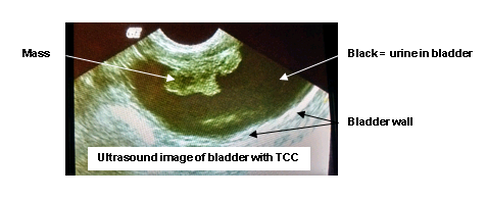Transitional Cell Carcinoma (TCC) is a cancer of the urinary bladder. Transitional cells are the cells that line the bladder wall, TCC is a cancer that arises from these cells. The exact cause is unknown, however, an increased risk of this cancer is found in certain breeds of dogs. Shetland sheepdogs, West highland terriers, Scottish terriers and Beagles are breeds predisposed to TCC.
Symptoms include:
- Blood in the urine
- Straining to urinate
- Frequent or unexplained bladder infections
The diagnosis of TCC is often made after ruling out more common causes of the above list of symptoms (such as bladder stones, infections or other benign causes of blood in the urine and straining to urinate). Several diagnostic tests will be needed to confirm the diagnosis of TCC.
- Urinalysis – will reveal blood and sometimes abnormal cancer cells can be seen.
- Urine culture – allows for infection secondary to the tumors to be treated with appropriate antibiotics.
- Radiographs – rules out stones in the bladder
- Ultrasound – will show abnormal masses in the bladder wall, but can also show us crystals, stones or polyps in the bladder
- Cystoscopy – A tiny flexible camera that can be inserted like a catheter through the urethra into the bladder to help visualize and biopsy bladder masses
- Catheterization – in some cases a urinary catheter can be placed in male dogs that helps collect a small sample of cells for cytology
- Cytology — evaluation of cells by a pathologist
Treatment
- Chemotherapy – available through veterinary oncologists.
- Surgical removal – possible only if mass is in a location favorable for surgery.
- Conservative/palliative care – piroxicam is an oral medication often used due to its anti-inflammatory properties and possible anti-tumor activity.
Your veterinarian will help formulate a diagnosis and treatment plan best suited for your pet’s needs.


